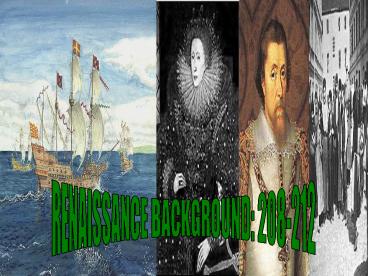RENAISSANCE BACKGROUND: PGS:208-212 - PowerPoint PPT Presentation
1 / 27
Title:
RENAISSANCE BACKGROUND: PGS:208-212
Description:
Title: RENAISSANCE BACKGROUND: PGS:208-212 Author: Preferred Customer Last modified by: Klein Indepedent School District Created Date: 11/27/2005 8:03:24 PM – PowerPoint PPT presentation
Number of Views:110
Avg rating:3.0/5.0
Title: RENAISSANCE BACKGROUND: PGS:208-212
1
RENAISSANCE BACKGROUND 208-212
2
Spanish Armada
- By DeLisa Goudeau
3
What is It?
- A vast fleet of warships
- The term applied to a massive fleet dispatched
against England by Spain's Catholic King Philip
II in 1588, which lead to an early and important
confrontation in the nearly 20-year Anglo-Spanish
War of 1585-1604 . - The object of the Armada was to replace the
Protestant monarch with a friendly catholic ruler.
4
The History of the Spanish Armada The start of
the war
- Between 1587 and 1588 rumors that King Philip of
Spain was assembling a massive fleet to conquer
England and Ireland were began to spread - Elizabeth believed that a war situation could be
avoided - The real purpose of the Armada was to enable the
army of the Duke of Parma to cross in safety from
France to England and to destroy the English
fleet
5
The History Cont
- At this point food and water were scarce and the
food was rotten. - The Spanish Armada moved from the tight mouth of
the English channel confusing and defying the
English. - The English broke their formations by sending in
fireships at night. - The Spanish lost many men and ships while the
English were unharmed. - The defeat of the Armada was Queen Elizabeths
greatest accomplishment.
6
After its all over
- Despite the defeat of the Spanish Armada, the war
between England and Spain lasted until 1604. - The defeat of the Spanish Armada nearly destroyed
the national treasury of Spain. - The defeat brought about English nationalism and
assured Englands independence from Catholic
countries of the Mediterranean. - This was a major turning point in English
history.
7
Setting of the War of the Ships
- The battle took place in 1588 in the Irish Sea
- The battle was part of the 20 years war starting
in 1585 and ending in 1604.
8
A FLOOD OF LITERATURE
9
A FLOOD OF LITERATURE
- William Caxton introduced the printing press to
England, enabling a faster publication of books.
- The English were able to write with ease since
they had a firmly established religion and
national identity
10
A FLOOD OF LITERATURE
- After the defeat of the Spanish Armada, most
literature was a tribute to Elizabeth I. - They would depict her as Gloriana, Diana, the
Faerie Queene and Cynthia in poetry, dramas and
fiction.
11
A FLOOD OF LITERATURE
- Theatre during this time seemed to greatly
expand, especially with encouragement from the
Queen. William Shakespeare is an example.
12
Decline of the Renaissance
- A Dull Man Succeeds a Witty Woman
13
James VI of Scotland
- Elizabeth Is second cousin
- Son of Mary Queens of Scots
- Became James I of England
- Reigned from 1603 to 1625
14
Family Feud
- James I
- Inability to resolve (postpone) critical issues.
Ex religious and economic - Spendthrift
- Thick-tongued goggle-eyed
- Foreigner to England
- Elizabeth I
- Ability to resolve (postpone) critical issues.
- Thrifty
- Glamorous witty
- Englishwoman
15
James I trying so hard
- Wrote books supporting the divine right of kings
and against tobacco - Patronized Shakespeare
- Sponsored new translation of the Bible
- Bad relationship w/ subjects (pious,
puritanically minded merchants) - Somehow described as an admirable man and
benevolent, peaceful ruler.
16
Charles I
- James Is son
- Reigned from 1625 to 1649
- Remote
- Autocratic
- Self-destructive
- Beheaded in 1649 by most powerful subjects
17
Oliver Cromwell
- Puritan dictator who ruled England (along with
Parliament) - Reigned from 1649 to 1660
18
Return of the King Charles II
- Son of Charles I
- Self-indulgent
- Came back in 1660 from being exiled in France
- His return usually marks the end of the English
Renaissance
19
End of the Renaissance
- End of moral and religious values
- Educated people became more worldly in their
outlook - Scientific truths were soon to challenge
long-accepted religious beliefs
20
Elizabeth I
- Nickname
- Good Queen Bess
- Born to Henry VIII and Anne Boleyn
21
Mary Queen of Scots
- Married at age 16 to Dauphin Francis of France,
who was 14 - Tried to assassinate her sister multiple times
22
James I
- Ruled Scotland for 58 years
- Ruled England for 22 years
- Happy to rule England to get away from all the
bloody murder in Scotland - One of the reasons the pilgrims came to America
- Died from a stroke
23
Charles I
- Had many unsuccessful attempts at marriage
arrangements - Married a 15 year-old
24
JEWISH LIFE IN ENGLAND
25
JEWISH LIFE IN ENGLAND
- Since Edward I expelled most of the Jews in 1290
over a land ownership dispute, there werent many
left. - There was some relief for them when Oliver
Crowell was ruling
26
JEWISH LIFE IN ENGLAND
- Most thought of the Jews as greedy, seen in
Shakespeares The Merchant of Venice. - The character Shylock was a Jew, who was cruel
and greedy.
27
JEWISH LIFE IN ENGLAND
- The Jews were continually persecuted and had to
live in ghettos and move from city to city.































